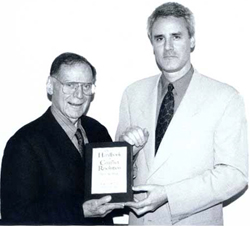Filed Under > Opinions
Bottom-Up Peace
With Israeli-Palestinian conflict again at stalemate, TC Emeritus Professor Morton Deutsch and current faculty member Peter Coleman argue (in a piece published in The Huffington Post) that the current upheaval in the Mideast offers a critical opportunity for citizens on both sides to push their governments for progress.
The protracted Israeli-Palestinian conflict has again reached a stalemate and negotiations between the parties have broken off. However, we believe it is urgent that the United States and the others in the Quartet (The UN, the EU and Russia) take steps to initiate a renewed movement for peace. It is urgent because the Egyptian revolution is likely to harden positions on both sides of the conflict making it unlikely that negotiations will resume unless there is an important, dramatic change. With the deadlock, we believe that the Palestinians will suffer even more than they have under Israeli occupation and the Israelis will be exposed to increasing danger from long-range missiles able to hit large population centers in Israel.
Our proposal is:
- The United States, preferably with the other members of the Quartet, present the Geneva Accord, which was unofficially negotiated by a team of highly respected Israelis and Palestinians, as the final agreement between the Israelis and Palestinians. However the Accord must be ratified by referendum by each of the two populations. It presents a comprehensive solution to most issues (including security, border crossings, the Implementation and Verification Group (IVG), roads, water management, environmental concerns, the economy, and the division of Jerusalem) vital to ensuring the end of the conflict and the realization of the national visions of both parties.
- Prior to the referendum, the United Nations would take responsibility to see that the details of the agreement be widely and accurately publicized through media accessible to both populations. These information sessions should begin within communities facilitating shared understanding of the current issues and the Accord. This would help buffer against the intentional use of misinformation in fostering political divisions. The UN could look to groups like the Public Conversations Project and the National Issues Forum as well as local Israeli-Palestinian dialogue groups for guidance here. In addition, a comprehensive understanding of the Accord would need to be made accessible to others as well, including other Arab-speaking countries in the region and the large Diasporas around the globe.
- An agreement is only the start of a peace process. To help its further development as well as to incentivize the agreement, we propose that the Quartet offer a contemporary version of the Marshall Plan that would involve Israel and Palestine as well as other Arab countries (such as Egypt, Jordan, Lebanon, Syria and Tunisia) in a large scale economic redevelopment initiative aimed at a cooperative reconstruction of basic infrastructure, education, healthcare, housing and business and industry across the region. These activities should involve members of both communities in joint-projects aimed at improving the day-to-day existence of the general populations.
This proposal is based upon the recognition that the Israeli government and the Palestinian Authority have, after many attempts, been unable to come to a final agreement. Their continued hostility is not only dangerous for both communities, but it also poses a serious threat to many other nations including the United States. The two parties are deadlocked and stalemated largely because of extremists on both sides. We believe that the general populations of Israel and the Palestinian territories would both support the Geneva Accord, or some modification of it. This would by-pass the stalemated official negotiations and place an agreement in the hands of the most important parties: the citizens on both sides.
The time to act in NOW. The recent events in Egypt, Tunisia, and elsewhere in the region present both potential danger and potential opportunity for a radical shift in the conflict dynamics in Israel-Palestine. We believe that implementation of this proposal provides the best chance for a permanent productive Israel-Palestine peace and for the democratic transformation of many of the nations in the Middle East.
See Huffington Post article: http://www.huffingtonpost.com/peter-t-coleman-phd/bottomup-peace_b_848164.html
Morton Deutsch, PhD is E. L. Thorndike Professor Emeritus at Teachers College, Columbia University, founding director of the International Center for Cooperation and Conflict Resolution, author of The Resolution of Conflict: Constructive and Destructive Processes and co-editor of The Handbook of Conflict Resolution: Theory and Practice.
Peter T. Coleman, PhD is on faculty at both Teachers College and the Earth Institute at Columbia University, Director of the International Center for Cooperation and Conflict Resolution, co-editor of The Handbook of Conflict Resolution: Theory and Practice and author of the forthcoming book: The Five Percent: Finding Solutions to Seemingly Impossible Conflicts.
Published Sunday, Apr. 17, 2011
